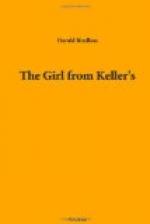In the meantime, Charnock, half asleep, lounged with his legs stretched out to the fire. The logs snapped and a fitful wind stirred the tops of the pines. Now and then some snow fell from a branch and a loose roofing shingle rattled, but by degrees the sounds died away. Everything was strangely quiet, except for the roar of the river, which had got more distinct. Charnock shivered and felt a puzzling tension. It was often calm at night, particularly in hard frost, but he felt as if something was going to happen. Looking up, he saw Festing nod with his eyes half shut, and felt for his tobacco.
While he cut the plug, the silence was broken. There was a humming in the pine tops and light branches began to toss. The draught from the door got stronger, but did not bite as keenly, and it sounded as if the snow was falling from the trees. Then some slipped down the roof, and getting up with tingling nerves, he opened the door. All the trees were rustling and waves of sound came up the valley. The sound swelled, the air felt damp, and a drop of moisture from the roof splashed upon his head. He drew a deep breath of relief, for a warm wind from the Pacific was roaring through the defile. Then Festing dropped the newspaper.
“Why have you opened the door?” he asked drowsily, and got up with a jerk as the draught swept the smoke about the room.
“A Chinook!” he exclaimed, and ran to the door. “We’ll have rain and warmth while it blows.”
“It’s great!” said Charnock hoarsely. “We are through the worst!” Then he caught Festing’s arm and laughed. “Say something wise, partner; I want to shout and dance.”
“You had better go to bed. It will be thawing hard to-morrow, and there’s much to be done. A Chinook doesn’t last long in the mountains.”
“This Chinook is going to last until we put the rails down,” Charnock replied.
CHAPTER XXV
THE THAW
When Festing went out at daybreak the air was soft, and drops from the wet pines fell into the honeycombed snow. The surface was turning to slush, but he knew it would wear down into a slippery mass on which the logs would run. This was fortunate, because he doubted if labor could be usefully employed upon the stones just yet. For a few moments he pondered the matter and listened to the river’s turmoil. The deep, booming note was sharper, water splashed noisily in the gullies, and there was a ringing crash as an ice-floe broke upon a rock. Then he turned as Charnock came up.
“Which is it—logs or stones?” the latter asked.
“Logs, I think; we can handle them easily,” Festing replied. “The other job is urgent, but the thaw has only begun, and when the ground gets properly soft we’ll do twice as much as we could now. Still, there’s a risk. We could make some progress with the track, and the warm spell mayn’t last.”




